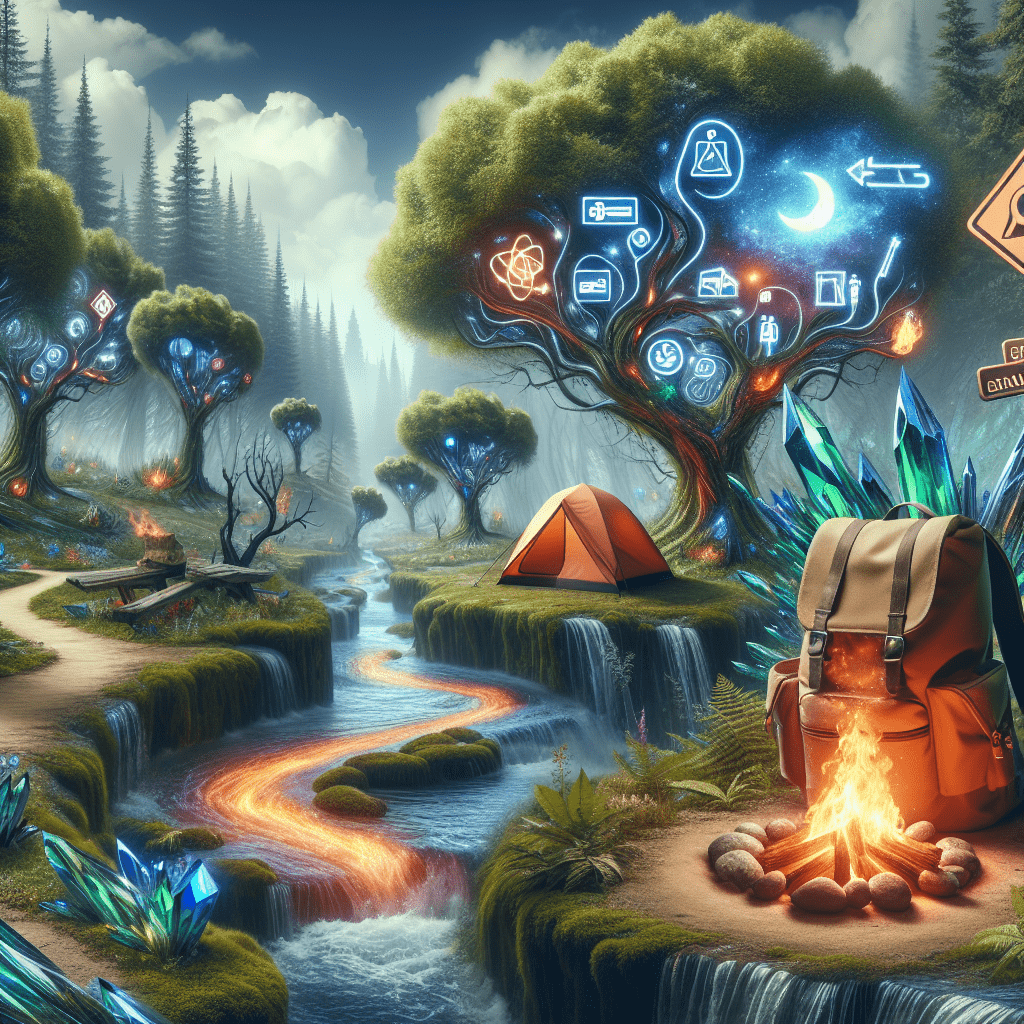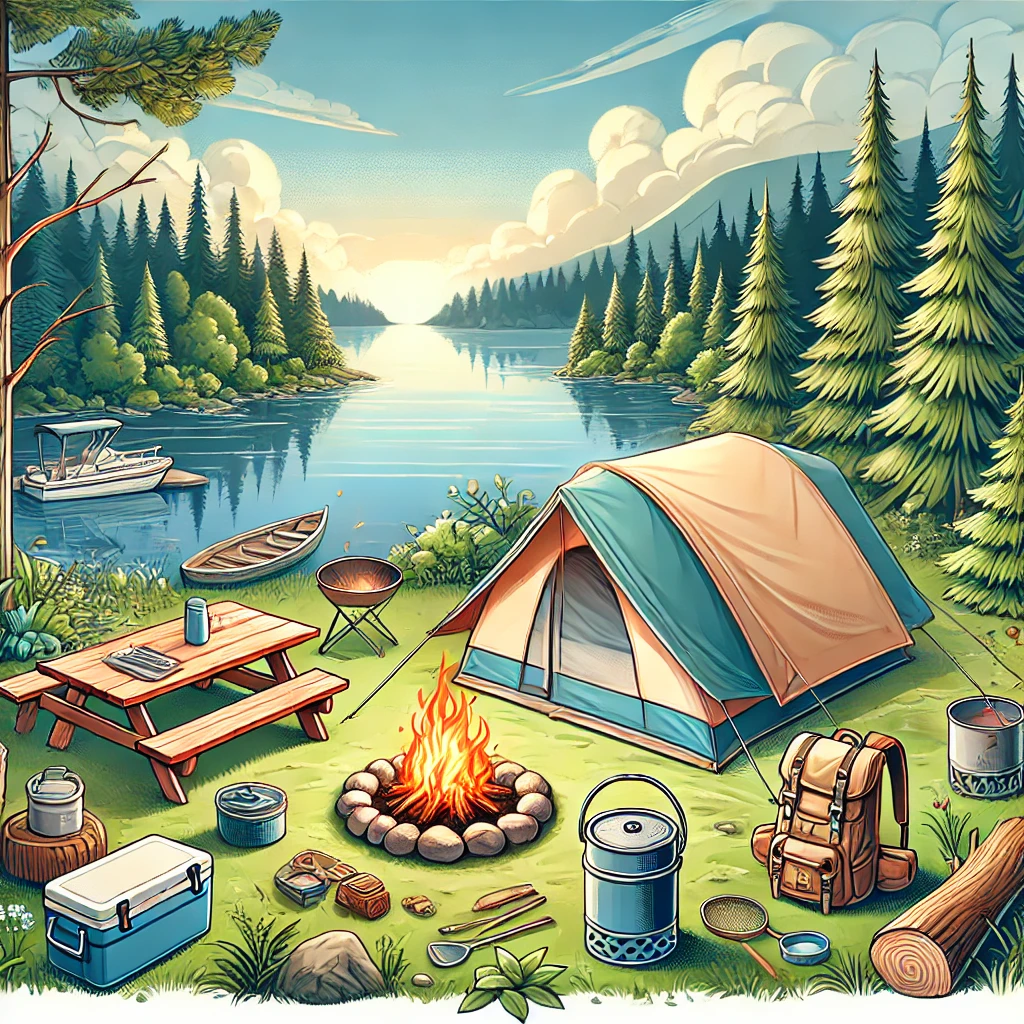Camping is an exhilarating way to experience the great outdoors, disconnect from daily stress, and spend quality time with loved ones. For beginners, the idea of camping might seem daunting, but with a bit of preparation and knowledge, it can become one of the most enjoyable and rewarding experiences. This comprehensive guide covers all the essentials to help you get started, from choosing the right campsite to setting up your gear and ensuring safety. By the end of this guide, you’ll have the confidence to embark on your first camping trip.
Why Camping is Perfect for Beginners
Camping is an ideal activity for those new to the outdoors due to its accessibility and minimal requirements. It offers a manageable challenge while providing a rich, immersive experience in nature. Beginners can start with simple, low-impact camping trips and gradually explore more complex adventures as they gain experience.
I vividly recall my first camping trip: a mix of excitement and anxiety about sleeping under the stars and cooking over an open flame. Despite the initial nervousness, the experience turned out to be incredibly rewarding. From the tranquility of the natural surroundings to the joy of preparing meals outdoors, it became a favorite way to escape city life and connect with nature.
Choosing the Right Campsite
Selecting the perfect campsite is crucial for a successful camping experience. Consider these key factors when making your choice:
- Location: Decide whether you want to camp in a national park, state park, or private campground. National parks often offer scenic beauty and various amenities, while state parks may provide a more tranquil experience. Private campgrounds can offer additional comforts like hot showers and electric hookups.
- Amenities: Check if the campsite has amenities such as drinking water, restrooms, and picnic tables. Some campgrounds offer additional features like fire rings, grills, and electrical outlets.
- Type of Campsite: Determine whether you prefer a primitive (backcountry) site, which offers a more rugged experience but requires more preparation, or a developed campground with more facilities. Primitive sites often require hiking to reach and may have limited amenities, while developed campgrounds are easily accessible by car and offer a higher level of comfort.
The National Park Service provides a wealth of information on finding and reserving campsites across the U.S. Their website nps.gov offers detailed descriptions of campsites, including amenities and availability.
Essential Gear for Beginners

Equipping yourself with the right gear is vital for a comfortable and enjoyable camping experience. Here’s a comprehensive list of essential items:
- Tent: Choose a tent that suits your group size and the expected weather conditions. Three-season tents are versatile and suitable for most camping conditions, providing protection against rain, wind, and moderate snow.
- Sleeping Bag and Pad: Select a sleeping bag rated for the temperatures you expect. For added comfort and insulation, use a sleeping pad. Inflatable pads offer extra cushioning, while closed-cell foam pads are lightweight and durable.
- Cooking Gear: Bring a portable stove or campfire cookware, including pots, pans, and utensils. Don’t forget to pack fuel for your stove and a cooler if you plan to store perishable food items. Compact cooking sets often include a stove, pots, and a grill, making them convenient for beginners.
- Clothing: Pack moisture-wicking base layers to keep you dry, an insulating layer for warmth, and a waterproof outer layer to protect against rain. Choose clothing that is versatile and quick-drying.
According to Sarah Johnson, an outdoor gear expert, “Invest in high-quality gear that matches your needs and the climate you’ll be camping in. Proper gear ensures your comfort and safety, making your camping experience more enjoyable.”
How to Set Up Your Campsite
Setting up your campsite correctly can significantly enhance your camping experience. Follow these steps for an efficient setup:
- Choose a Flat Area: Find a level spot for pitching your tent, ideally away from potential hazards like rocks, roots, and low-lying areas prone to water accumulation.
- Pitch Your Tent: Follow the manufacturer’s instructions for setting up your tent. Ensure it is securely staked down to prevent it from collapsing in strong winds. Attach the rainfly to provide additional protection from rain.
- Organize Your Campsite: Create designated areas for cooking, dining, and sleeping. Keep your cooking and food storage areas away from your tent to avoid attracting wildlife. Use a camp table or a designated area for meal preparation and dining.
On my first camping trip, setting up the tent in the dark proved challenging. A headlamp and some patience made the process smoother. Since then, I always ensure to set up my tent during daylight and double-check everything before dark.
Basic Camping Skills and Techniques
Developing basic camping skills enhances your experience and ensures safety:
- Building and Managing a Campfire: Start a fire with dry wood and kindling. Build a small fire and gradually add larger logs. Always fully extinguish your fire before leaving the campsite or going to bed. Use a fire ring if available to contain the fire and reduce environmental impact.
- Cooking on a Campfire or Portable Stove: Use a grill grate or campfire-safe cookware for cooking. Plan simple meals that are easy to prepare and cook. Avoid using heavy or complex cooking equipment that may be difficult to manage.
- Keeping Food Safe: Store food in airtight containers to keep it fresh. Use bear-proof containers or hang food away from your tent if camping in bear country. Proper food storage helps prevent wildlife encounters and maintains hygiene.
The U.S. Forest Service offers valuable guidelines on campfire safety and cooking techniques. Visit fs.fed.us for detailed information on fire management and outdoor cooking.
Safety Tips for New Campers
Ensuring safety during your camping trip is essential. Here’s what you need to know:
- Weather Conditions: Always check the weather forecast before your trip. Prepare for sudden changes in weather by packing appropriate clothing and gear. Be aware of potential hazards like thunderstorms, high winds, or extreme temperatures.
- Wildlife Safety: Learn about the wildlife in your camping area and take precautions to prevent encounters. Store food properly and avoid attracting animals to your campsite by keeping food sealed and disposed of correctly.
- First Aid Basics: Carry a well-stocked first aid kit that includes bandages, antiseptics, pain relievers, and any personal medications. Familiarize yourself with basic first aid procedures, including how to treat common injuries like cuts, burns, and sprains.
Safety expert Dr. Jane Smith emphasizes, “Being prepared for emergencies is crucial. A well-stocked first aid kit and knowledge of basic safety protocols can prevent minor issues from escalating into serious problems.”
Camping Etiquette and Leave No Trace Principles
Respecting nature and fellow campers is key to a positive camping experience:
- Respecting Others: Maintain low noise levels and be considerate to fellow campers. Follow campground rules and regulations, and respect quiet hours to ensure everyone can enjoy their experience.
- Leave No Trace: Adhere to the Leave No Trace principles to minimize your impact on the environment. This includes packing out all trash, avoiding damage to vegetation, and using established fire rings to prevent damage to the landscape.
The Leave No Trace Center for Outdoor Ethics provides comprehensive guidelines on minimizing environmental impact. Visit lnt.org for more information on responsible camping practices.
Exploring Campgrounds and Local Trails
Exploring nearby trails and areas can enhance your camping experience:
- Beginner-Friendly Trails: Choose trails that offer gentle terrain and clear markings. Many campgrounds feature short, easy hikes suitable for beginners, allowing you to experience the beauty of the area without a strenuous hike.
- Safety: Inform someone of your hiking plans and carry a map or GPS device. Always stay on marked trails and follow local guidelines for hiking and trail use.
On a past camping trip, we discovered a scenic trail close to our campsite. The easy hike provided stunning views and a peaceful retreat, becoming a favorite spot for future trips.
Common Mistakes to Avoid
Avoiding common mistakes can improve your camping experience:
- Overpacking: Bring only essential items to avoid carrying excess weight. Focus on packing lightweight, versatile gear that serves multiple purposes.
- Ignoring Weather Conditions: Always check the weather forecast before your trip and prepare for various conditions. Being unprepared for unexpected weather changes can affect your comfort and safety.
- Neglecting Safety: Follow safety guidelines and prepare for emergencies. Adequate preparation and knowledge of safety procedures can prevent most issues and ensure a successful camping trip.
Camping veteran Mark Thompson notes, “Beginners often make the mistake of overpacking or underestimating weather conditions. Proper preparation and awareness can prevent most common issues.”
Resources and Tools for Beginners
Equip yourself with useful resources for a successful camping experience:
- Books and Websites: Recommended readings include “The Ultimate Hiker’s Gear Guide” by Andrew Skurka for gear advice and “Camping and Woodcraft” by Horace Kephart for classic camping techniques. Websites like REI.com provide gear reviews, tips, and camping advice.
- Apps: Download camping apps such as All Trails for trail information, Compendium for campground reviews, and The Weather Channel for weather updates.
Outdoor gear review sites and forums offer valuable insights into the best products and practices. Websites like Backpacker.com feature expert reviews and camping advice.
Conclusion
Camping for beginners offers an exciting opportunity to connect with nature, create lasting memories, and gain confidence in outdoor skills. By choosing the right campsite, preparing essential gear, and following safety guidelines, you’ll be well-equipped for a successful camping adventure. Embrace the experience with an open mind and a spirit of curiosity. Your first camping trip will be the start of many unforgettable outdoor adventures.
Ready to embark on your camping adventure? Start by planning your trip and gathering your gear. Explore our other articles for more tips and recommendations to make your camping experience truly memorable.
Q&A
- What should I pack for my first camping trip?
- For a first camping trip, pack a tent, sleeping bag, sleeping pad, cooking gear, clothing suited for the weather, and personal items like toiletries. Essential gear includes a flashlight or headlamp, a first aid kit, and food and water.
- How do I choose the right campsite?
- Consider the location, amenities, and type of campsite. Research campgrounds in advance, check for reviews, and choose a site that fits your comfort level and preferences.
- What are the best beginner-friendly camping destinations?
- National and state parks with well-established campgrounds are great for beginners. Look for parks that offer easy hiking trails, amenities, and accessible campsites.
- How can I ensure safety while camping?
- Check the weather forecast, be aware of wildlife in the area, and carry a first aid kit. Follow campsite rules, practice proper food storage, and inform someone of your plans.
- What are Leave No Trace principles and why are they important?
- Leave No Trace principles involve minimizing your impact on the environment by packing out all trash, respecting wildlife, and avoiding damage to vegetation. They are important for preserving natural areas and ensuring a positive experience for future campers.
External Resources
- National Park Service – Information on finding and reserving campsites.
- U.S. Forest Service – Guidelines on campfire safety and outdoor cooking.
- Leave No Trace Center for Outdoor Ethics – Guidelines on minimizing environmental impact.
- Backpacker.com – Gear reviews and camping advice.
Support us! Wilderness gear Pro may earn a small commission from affiliate links in this article. Learn More

